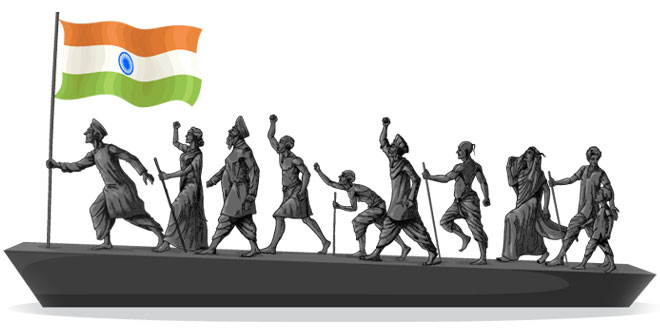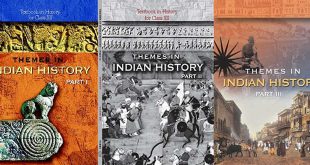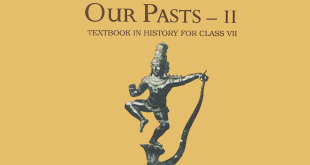Question: Discuss the factors that led to the rise of nationalism in India.
Answer: The main reason for the rise of nationalism was the contradiction between the colonial regime and the Indian people. The exploitative and alien character of the British rule led to the resentment and many uprisings among the Indians. To maintain effective control of the government the British adopted several measures. But these measures also helped the Indians to evolve a conception of Indian nationalism. A major form of the colonial rule was on centralisation. It strove to govern the British-ruled portion of India from a single centre. It also created a unified system of administration. Thus the military, police, judiciary, revenue collection departments and various other system of governance were made uniform for the whole of British-ruled territories. Many of the princely states also tended to follow the British pattern. At a somewhat different level, the colonial government also tried to create a unified market in order to sell its industrial goods without hindrance. The import of machine-made goods from England destroyed the Indian artisanal industry and the working of revenue policies tended to erode the rural and local self- sufficient economy.
Question: ‘India was unified under British rule as one unit explain.
Answer: India was unified under British rule as one unit not all the times but during the second world war around the year 1939. The British government agreed to give the Indians the right to rule themselves to some extent. they needed support from India during the world war . The congress party people asked them to leave India free after the world war .also most congress leaders were opposed to Hitler, Mussolini and the ideology of fascism. the British were willing to give the status of dominion to India under the British crown soon after the war but in the beginning they thought of India to rule as long as possible. the congress wanted a promise note from British that they will give freedom to India soon after the war but they refused saying that they have to also protect their interests in India.
Question: Write a short note on political associations formed in India after 1850. Mention the role played by the Poona Sarvajanik Sabha and others.
Answer: Early Political Associations: After 1850, many political associations were formed. Most of them were formed in the 1870s and 1880s. Most of these associations were led by English-educated professionals. Some of the important ones were; the Poona Sarvajanik Sabha, the Indian Association, the Madras Mahajan Sabha, the Bombay Presidency Association. The Indian National Congress was also formed during this period. The naming conventions of these political associations suggest that they wanted to take issues which affected all the people of India; although many of these associations functioned in specific parts of the country.
- Pune Sarvajanik Sabha, was a sociopolitical organisation in British India which started with the aim of working as a mediating body between the government and people of India and to popularise the peasants’ legal rights.
- It started as an elected body of 95 members elected by 6000 persons on April 2, 1870.
- The organisation was a precursor to the Indian National Congress which started with its first session from Maharashtra itself. The Pune Sarvajanik Sabha provided many of the prominent leaders of national stature to the Indian freedom struggle including Bal Gangadhar Tilak. It was formed in 1870 by S. H. Chiplunkar, Ganesh Vasudeo Joshi, Mahadev Govind Ranade, et al.
- The ruler of the Aundh State, Bhawanrao Shriniwasrao Pant Pratinidhi was the first President of the organisation.
- Many eminent personalities such as Bal Gangadhar Tilak, Gopal Hari Deshmukh, Maharshi Annasaheb Patwardhan,etc. served as the Presidents of the organisation. In 2016, Meera Pavagi was elected as the first woman President of the organisation.
 Class Notes NCERT Solutions for CBSE Students
Class Notes NCERT Solutions for CBSE Students





Pura book hi chap thya hai
Sala fake
Please don’t paste the nude advertising. Many times complained for this. But no solutions….
The advertisements are provided by Google depending on cookies or last search made on your computer or smartphone. Please clean your cache, these will stop appearing. It’s not our hand. – Admin